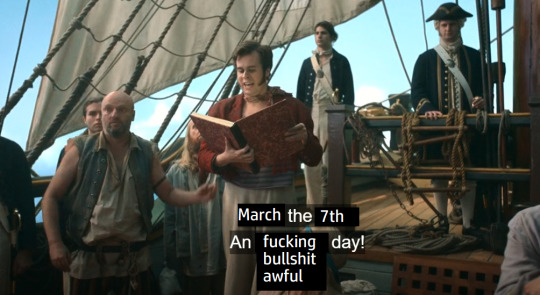Text
I’d like to thank Shearwater (whoever they may be) for posting a new chapter of Constellationism (part 2 of their Temptation ‘Verse) on AO3 on Election Day. It sparked me to reread from the beginning of the series and has helped keep me grounded through some hard days. Probably not intentional timing, but well appreciated.
Sometimes self-care is hopping for a bit into a lovely AU where people are kind and falling in love. Here is the link in case others could use a similar support.
9 notes
·
View notes
Text
HONK!!!!


“… the door is open for this possibility in the future” 👀👀👀 thank you Screenrant for this amazing article! Our makeup never came off and we’ll never stop honking 🤡
415 notes
·
View notes
Text
Seen in person at this morning’s Rainbow Community Yoga Flow.
Want. If anybody knows where to get this lovely shirt, please let me know in the comments. The wonderful human wearing it forgot where he got it.

55 notes
·
View notes
Text
That fish wants to be caught!
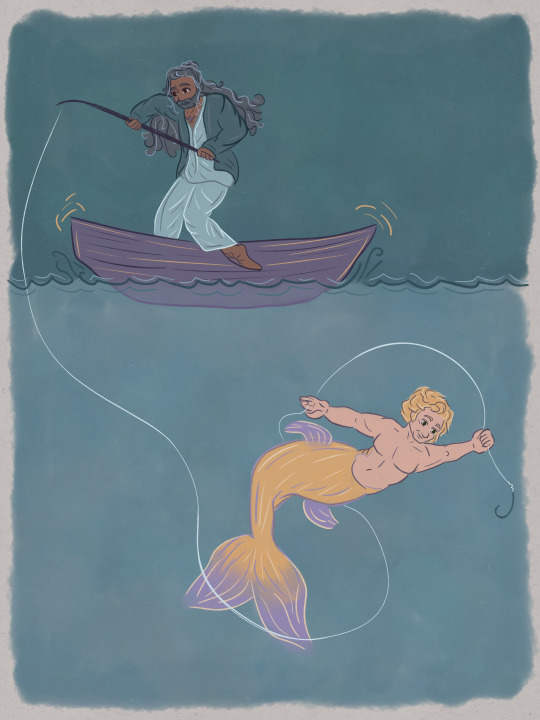
gone fishin'
195 notes
·
View notes
Text
Our Flag Means Death AO3 has hit 30,000 works! It seems like yesterday that it hit 20,000.
Thank you to all the amazing writers and artists who have made that little corner of the internet my second home.
212 notes
·
View notes
Text
Yup.
Izzy: He's a complicated man.
Ed: I HAVE BEEN SAYING EXACTLY WHAT I WANT FOR TWO GODDAMN SEASONS.
337 notes
·
View notes
Text
How to Ditch Amazon


Support your local libraries and the small businesses that are actually making the products you want. Fuck Jeff Bezos and the systemic, universal worker abuse, gaslighting, and brutality they live off of.
162K notes
·
View notes
Text
Chaos daddy gonna chaos.
shoutout to those of us on this hellsite who don’t dare to venture into the cesspool that is ofmd twitter

834 notes
·
View notes
Text
Homepage painting by Melissa Simms, “Little Sister Life", 36”x 24”, oil and acrylic on wood with resin finish
2 notes
·
View notes
Text
Ha!!!
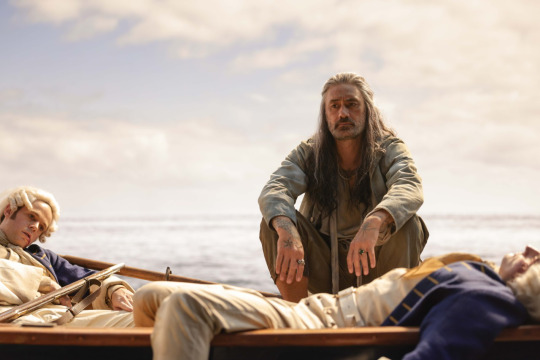

I like to think that Ed spent a full half hour sat here trying to figure out which bit of the ocean he yeeted his leathers into.
997 notes
·
View notes
Text
Absolutely fucking magical.
It's unbelievable how much OFMD feels so reassuring. It feels like a warm hug and a promise that things will be alright.
OFMD really takes you by the hand and it says "if you think you're unlovable, if you think you'll never fit in, if you think there is something fundamentally wrong with you, I swear to fucking g-d you're wrong and there are people who will love you." It says no one is ever alone, and no matter how hard things get they can always get better, and if you're spending every day trying to be more authentically yourself then you can't go wrong. It doesn't try to downplay the bad and the evil in the world, but it says we'll be alright in spite of those things. Our spirit will outlive them.
And that's just fucking magical, honestly.
326 notes
·
View notes
Text
Amen.
OK, let’s say it, because we all know is it: Our Flag Means Death was cancelled because it’s gay.
It is a big gay show that eschews queer stereotypes and tropes, that doesn’t indulge in the straight cishet fantasy that being queer means being fundamentally unhappy, that refuses to queerbait or bury your gays, that doesn’t even glance at the idea that it would be better or easier to be straight.
It’s gay. It’s a gay show with a romance between two men as the main plot arc, and minor arcs about other romances. It shows queer people having fun and going on adventures and having complicated, rich lives in a fantasy world usually reserved for straight people. And it’s not a fantasy with hard-bodied twenty-somethings being cute and plastic and untouchable. It is people who look real, who look like folks in the neighborhood, who are middle-aged and BIPOC and disabled and fat and slender and short and tall. And they are gay.
If Max didn’t know how to market it, it’s because OFMD is gay. It’s not a workplace comedy or a buddy show or a pirate adventure that just happens to have queer characters - its queerness is baked into it. It is a critique of toxic masculinity and abuse and straight society, and it is gay. Super fucking gay. Stede Bonnet levels of gay.
They cancelled it because it’s gay and that should indeed worry anyone in any other fandom because the powers that be think that this is disposable, because much worse, much less successful shows where straight and white is the default just stride into another season without a pause.
And if you buy the narrative that this is anything other than real honest to fucking God homophobia, you are about to get hit with some real tough truths in the near future.
545 notes
·
View notes
Text
❤️

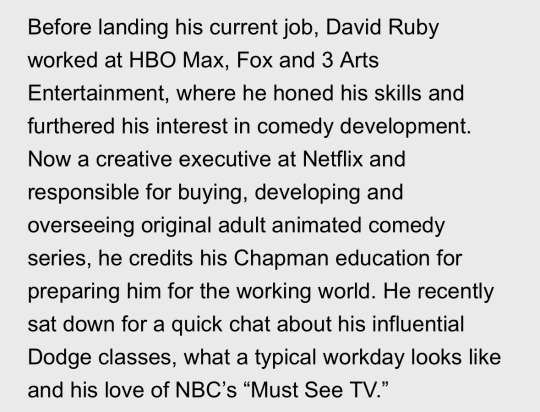
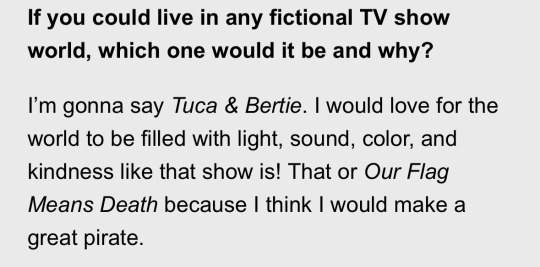

this is so hopeful alexa play tubthumping by chumbawamba
440 notes
·
View notes
Text
I love the posts explaining the background music and what it does. I’m a deaf/hoh person and my hearing aid and cochlear implant do not capture the background noises/music and it adds so much to the story it seems. I am grateful for the folks who point all this out.
Back on my OFMD music thing and realising the kraken theme (Voi Che Sapete) actually appears before the Swede sings it in this moment:

Which gets me thinking is the Swede actually singing the kraken theme or is it incidental to Ed's memories being stirred up by the double-whammy of being expected to kill someone and that same person talking about the presence of the monster Ed used to distance himself from his father's murder?

Because aaaaaa it's so Much and so Tasty.
It's the theme of Ed's belief that he is the terrible kraken and it gets knocked on the head in 2x08 when he kills the British soldiers to get Stede's letter and the brief burst of the theme is swallowed up by Gnossienne 5.

36 notes
·
View notes
Text
So well said.
I was thinking about the idea that homophobia doesn't exist in the world of Our Flag Means Death. I think it's clear that this is not the case, but it is a more complicated issue than what we think of when we discuss straightforward homophobia, and is closely aligned with how the different worlds represented in the show perceive sex, love, and desire.
(Before I get going, I want to be clear that I'm discussing the world of the show itself, not the world of the historical Caribbean in the 18th Century. Our Flag Means Death primarily uses history as a useful lens through which to filter our own time period and the things it wants to discuss, and so only uses history when it serves the show's purposes. These are all just my thoughts - I'm always happy to discuss them!)
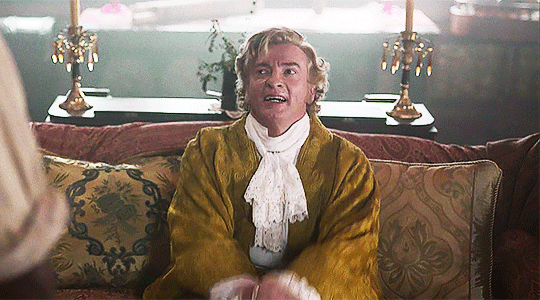
There are two major worlds at play in the show: the English gentry that Stede comes from, and the pirate world. In neither world is homosexuality explicitly treated as illicit or unacceptable, though it is never mentioned or shown in the English world. Most of the homophobia expressed by characters lies in the perceptions of the "right" and "wrong" ways of performing gender and sexual roles. I talked about this a bit here in regards to Izzy's homophobia.
In both the English and the pirate worlds, Stede's gender presentation is openly questioned. Stede is a fop - not necessarily a sexual marker one way or the other - but he's also, in the words of the show, soft. His father labels him a "weak-hearted, soft-handed, lily-livered little rich boy" who has never done a "man's work," blanches at the sight of blood, and is only inheriting his power from better, more masculine men.
Within the world of the show, Stede occupies a role typically reserved for female characters, in which he's sold in marriage to build his family's wealth. His romantic desire to marry for love is knocked down; it doesn't matter if he loves Mary or she loves him, or if there is even any desire on either side, because the whole point is to unite their wealth and produce heirs to carry on that wealth.
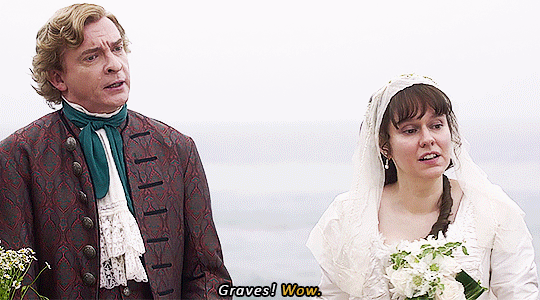
In Stede's memories, the shift from getting married to having children is instantaneous. Sex is implied, but it barely exists for him - it was simply something that he had to do to fulfill his part. Again, this casts Stede in a role often reserved for female characters in fiction. The function of sex, in the English world, is procreation. Desire hardly enters into it, and love certainly doesn't. So it is likely that Stede's only sexual experiences are ones without desire and without love. They are simply to fulfill a function.
Pirate society is significantly more open when it comes to expression of sexuality, but it is still steeped in sexual roles and requirements. Stede's outward queerness marks him out, but it's his inward queerness and how that integrates his emotional core that makes him unacceptable within the masculine hierarchy represented by Izzy and Calico Jack.
I've gone into Izzy's toxic masculinity and hatred of Stede's gender presentation elsewhere, but to reiterate briefly - Izzy's biggest problem with Stede is that Stede does not occupy the correct gender role within the masculine hierarchy, nor does he occupy a properly defined sexual role. He is, in Izzy's view, supposed to be submissive to a dominant male, and he's anything but. He breaks the rules of piracy and he breaks the rules of masculinity, without seeming to be aware that there are rules to break (at least in the pirate world). Stede is "wrong" in Izzy's understanding of masculinity and homosexuality, just as he is wrong in the Badmintons'/his father's understanding.
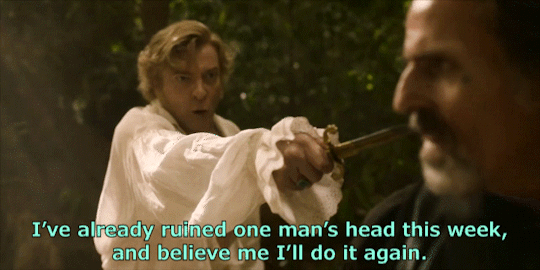
It is Stede's breaking of those rules that attract Ed to him in the first place. He doesn't act like a pirate should. He's strange. He's off-script. He's...queer. That queerness draws Ed in - far from being repelled by it, as Izzy thinks he should be, he's fascinated by it. Stede's softness and gentleness are things that Blackbeard should either reject or attempt to dominate, and he does neither.
What comes out in Stede and Ed's interactions is that Ed himself doesn't just desire softness, but is soft himself. Beneath the masculinity he puts on, he wants to be touched with kindness, he wants to be embraced. One of Stede's first questions is if he "fancies a fine fabric." When Ed says he does, Stede doesn't laugh at him or view this as un-masculine. He shows Ed as many fine fabrics as he can, excited to finally have another man with whom to exchange this love.
Ed also wants to be submissive without being hurt. He gets Stede to stab him in a performance of sex, but the act implies even more than that - that sex and pain are closely related in the pirate world, tied to sexual roles (men who penetrated and men who are penetrated). But Stede, once more, is a gentle man who penetrates. He doesn't see the stabbing as a sexual act, nor does he get a sexual thrill from causing Ed pain. Ed submits to a man who cares that he's being hurt, and it is this softness that Ed wants and is, as yet, unable to ask for.
(It is notable that, when Ed recalls the stabbing in "Fun and Games," his main memory is of Stede's look of concern.)
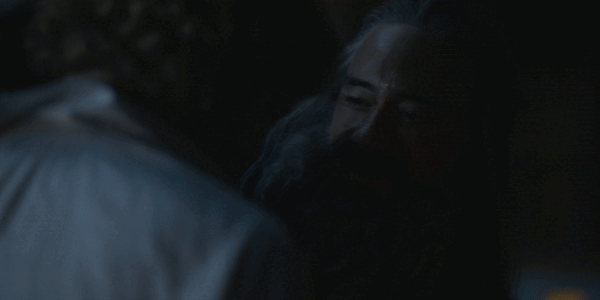
The role of sex, love, and desire in the pirate world is made clearest with Calico Jack, far and away the most explicit representation of a pirate's toxic masculinity, who also highlights the reading of sex as about power and pain, not love. Calico Jack and Stede's conversation is the first time that sexual relationships between men is actually raised, in explicit and vulgar terms as Jack asks Stede if he and Ed are "buggering each other" and tells Stede "Blackie and I have had our dalliances."
Jack views Stede's response as being ashamed, but we see clearly that it's not shame but anger. Stede doesn't like who Ed is with Jack, and he doesn't like Jack's vulgarity, simplifying sex, and especially sex with Edward Teach, down to pure functions, not expressive of love or desire, just as they are in the English world. Jack's attitude that this is simply what men do to (not even with) other men when they are at sea, and he's proving his dominance by telling Stede that he's done it with Ed.
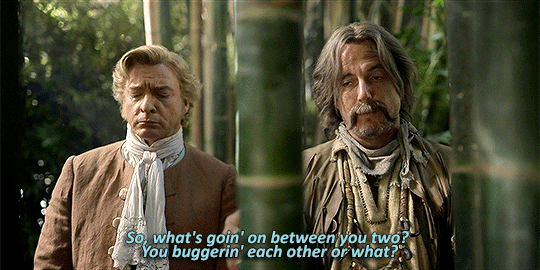
Stede is not ashamed at the assumption that he and Ed are having sex, but angry at the implication that sex between them would be "buggery" and "dalliance," not love (and, what's more, that Ed would be treated as a thing instead of a person by another man).
Stede's queerness is part of his emotional core - it is not a whim. It is not something he can discard or mask, regardless of how he dresses or behaves. It is not something that just "goes at sea," or that can be reduced to functions. It is integral to himself, and so he's been completely unable to conceal it from being perceived in either the English or the pirate world, though he has tried very hard to conceal it from himself.
Ed has also tried to conceal the emotional reality of his queerness via his performance as Blackbeard, turning it outward as violent games between men, without softer emotions. It is with Stede that his own emotional core is revealed, and the big mean pirate is shown to be a man who wants to be held and touched, to be submissive without being shamed or harmed.
They allow each other to be vulnerable, to move beyond their worlds' insistence on sex as being purely a function and to unite it with love and desire. Their romance develops out of friendship and a powerful emotional understanding that claims softness as strength.

Neither Stede nor Ed are acceptable in worlds dominated by toxic masculinity and controlled by rules of masculine hierarchy and power. But they are acceptable on the Revenge, filled with a crew of the "worst pirates in the world," all of whom openly, and increasingly, express fluid gender and sexual roles and identities that shift with relationships and feelings. Both are aligned with the queer liberation of the Revenge, itself shaped by Stede's ethos of kindness and breaking the "culture of violence" of piracy, but they have to break out of their worlds' underlying homophobia to find their way to each other.
627 notes
·
View notes
